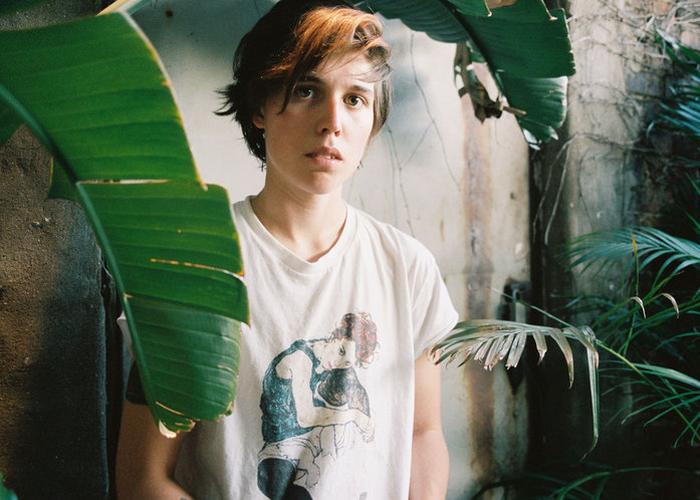
Genre:Avant / Experimental
Since the release of her debut self-recorded EP, Jekyll/Hyde, in early 2014 via Domino, Taryn Miller has experienced many firsts as an artist – her first tour (with Courtney Barnett), her first SXSW (in 2014, in support of the EP release), and her first time working in a proper studio with a producer. And now, the 24-year-old who resides in Lawrence, KS and makes music under the moniker Your Friend, begins the process of another first – the release of her debut full length album, Gumption, out January 2016.
Before recording Gumption, Miller searched for the right sonic touchstones for her full length. She struggled initially with the evolution of her sound, calling her EP “raw and innocent”, and was concerned with how to write newer material, while being conscious of a platform that could be wider reaching. Miller asked herself: How are you able to identify what is genuine to you and not under the guise of the potential to have a larger audience? After making calls to close friends, and even reaching out via email to the avant-garde composer William Basinski for advice, Miller took direction from perhaps an unlikely source – her former high school teacher, who simply said: ““Art is just where you are now. Where are you right now?” Miller used this simple maxim as the basis to start recording.
Miller began writing the songs that would become Gumption at her studio space and apartment in Lawrence, KS after returning from touring in mid-2014. As a part of the album’s process, Miller acquired a field recorder that she used to explore sound from a familiar place. She took it to her family farm in Winfield, KS and drove around, dipping her senses into childhood nostalgia. If you listen closely, you may be able to identify a few of these noises on Gumption – creek water and engine noise (on ‘To Live With’), the wings of pigeons on the walls of their cages (‘Who Will I Be…’).
Gumption builds on the ideas of Jekyll/Hyde, dealing with the dualities and nuances of human interaction, and questioning how much we, as individuals, are responsible for in the ways we are perceived. Jekyll/Hyde came from a place of, “how am I being affected,” while Gumption takes that and says, “how am I affecting?” Recording with producer Nicolas Vernhes (The War on Drugs, Deerhunter) at the Rare Book Room in Brooklyn helped Your Friend fulfill a penchant for drones, loops and found sounds. “I paid attention to textures,” Miller says. “I was trying to remove myself from an approach that I had followed before, but to be able to bring in that melodic element that is most inherent to me, and marry it with a more sonically meditative landscape.”
The album opens with “Heathering,” a brooding track Miller had been working on long before entering the studio. The opening acoustic guitar sample was something that Vernhes had caught before she knew they were tracking. It was left as somewhat of a playful placeholder initially, but then ultimately became an endearing and important part of the opening.
“Come Back From It,” was composed of salvaged pieces of an almost entirely scrapped song during the demoing process. The whirling, dark, drum loop (arguably the backbone) and the crackling drone were the only original pieces of audio from the demo. Vernhes encouraged that there was something about the lurching nature of those elements that was worth pursuing. Miller already had a sense of verses, but there wasn’t a “relief,” as Vernhes said, when referring to a chorus. Vernhes sat her in the control room and played Lou Reed’s “Pale Blue Eyes,” with the both of them in silence, then said, “you have thirty minutes, go write a chorus.” After the structure was formed, Miller took on the task of creating several, separate loops for each chord in the entire song, and Vernhes collaging them and achieving an overall cinematic type of texture.
“Gumption,” came from two separate songs that worked better blended together than apart. “I really struggled with this one initially. One of the songs was more lyrically strong, while the other may have had stronger progressions.” It ended up falling together in an unexpected way, with Vernhes sampling old drum machines in order to find a percussive element that would move the song. “He really amazed me with his ability to shape them and give them an entirely new presence with his mixing and editing.”
The record closes with “Who Will I Be in the Morning,” a haunting, shimmering track that nods at those first few, rewarding seconds that come with waking – that small amount of time in between sleep and consciousness, before you can decide how you feel about anything.
“The songs on the EP were coming from the lens I was looking through. Now, the lens is flipped around and facing me,” Miller says about her songwriting for Gumption. Thematically, the album deals with growing pains that come from self-inducing this sense of quiet that can be uncomfortably revealing. “I was sitting with myself so much, I got to kno